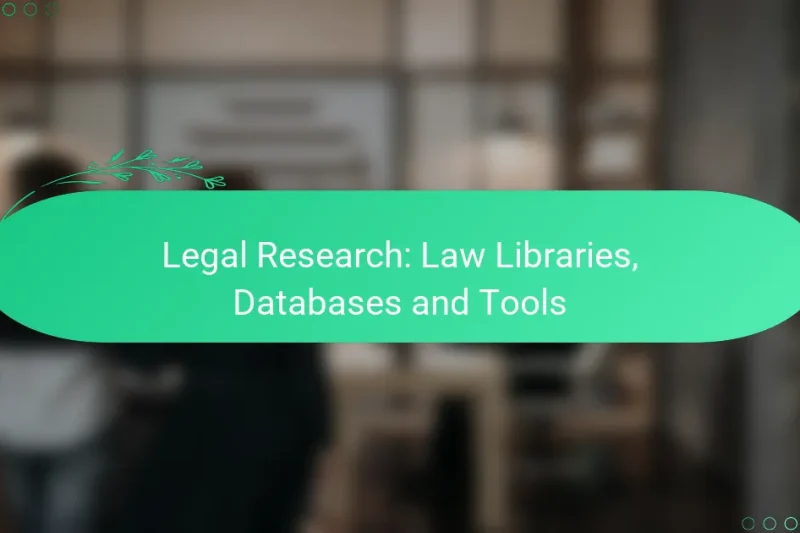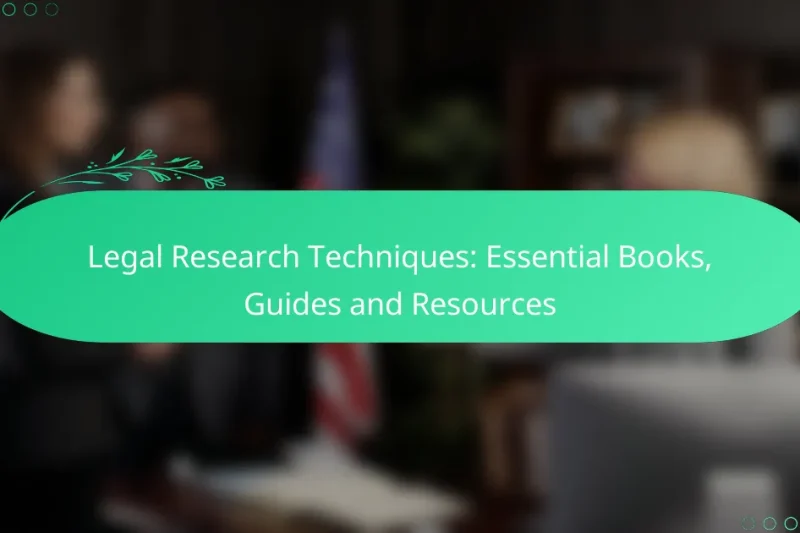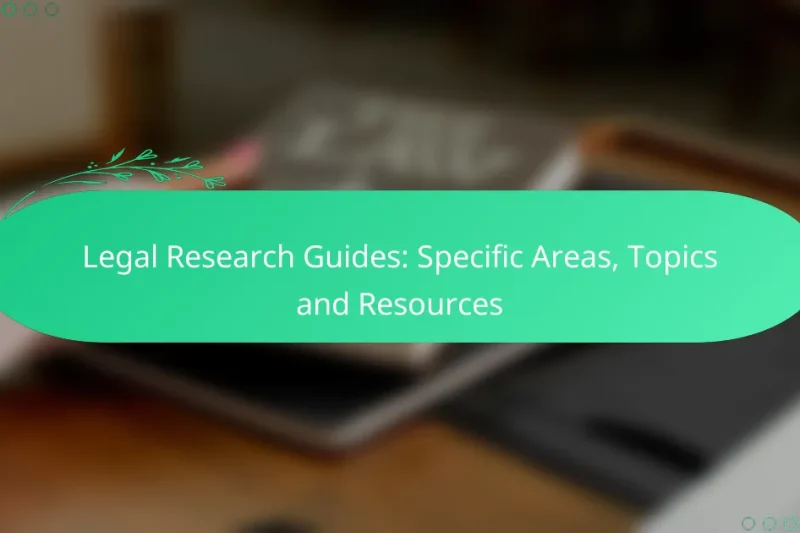Enhancing legal research skills is essential for legal professionals and students, and numerous online courses, workshops, … Legal Research Skills: Online Courses, Workshops and CertificationsRead more
Legal Research Resources
Legal research is a critical component for professionals navigating the complexities of the law. In the UK, resources such as Westlaw UK and LexisNexis UK offer comprehensive databases tailored to legal practitioners. Understanding the features and pricing of these platforms, along with exploring free options, can significantly enhance your research efficiency and effectiveness.
Legal Research Training: Webinars, Workshops and Conferences
Legal research training in the UK offers a variety of formats, including webinars, workshops, and conferences, … Legal Research Training: Webinars, Workshops and ConferencesRead more
Legal Research: Law Libraries, Databases and Tools
Legal research is a critical component of the practice of law, and utilizing the best resources … Legal Research: Law Libraries, Databases and ToolsRead more
Legal Research Resources: Professional Associations, Networks and Publications
Legal research resources are vital for both aspiring and practicing professionals, offering access to specialized materials, … Legal Research Resources: Professional Associations, Networks and PublicationsRead more
Legal Research Techniques: Essential Books, Guides and Resources
Effective legal research is crucial for practitioners in the UK, and a variety of essential books … Legal Research Techniques: Essential Books, Guides and ResourcesRead more
Legal Research Guides: Specific Areas, Topics and Resources
Legal research in the UK covers diverse branches of law, each with unique principles and resources … Legal Research Guides: Specific Areas, Topics and ResourcesRead more
What are the best legal research databases in the UK?
The best legal research databases in the UK include Westlaw UK, LexisNexis UK, HeinOnline, Lawtel, and Practical Law. Each platform offers unique features and resources tailored to legal professionals, making them essential tools for effective legal research.
Westlaw UK
Westlaw UK is a comprehensive legal research database that provides access to a vast array of legal materials, including case law, legislation, and legal journals. Its user-friendly interface allows for efficient searching and navigation, making it a popular choice among solicitors and barristers.
Key features include advanced search options, citation tools, and the ability to set alerts for updates on specific cases or topics. Subscription costs vary, so it’s advisable to evaluate your needs against the pricing structure.
LexisNexis UK
LexisNexis UK is another leading legal research platform that offers extensive resources, including primary and secondary legal materials. It is known for its robust search capabilities and comprehensive coverage of UK law, making it suitable for both practitioners and academics.
Users benefit from features like legal commentary, case summaries, and a wide range of practice area resources. Pricing is competitive, and many firms find value in its tailored packages based on their specific research needs.
HeinOnline
HeinOnline is a premier online research platform that specializes in historical and government documents, law journals, and treaties. It is particularly useful for legal scholars and researchers looking for primary sources and historical legal documents.
The database offers a unique collection of international law resources, making it a valuable tool for those involved in comparative legal studies. Access typically requires a subscription, which can be obtained through academic institutions or law firms.
Lawtel
Lawtel is a legal research service that focuses on providing timely updates and summaries of case law and legislation. It is particularly useful for practitioners who need to stay current with legal developments.
With its emphasis on concise summaries, Lawtel allows users to quickly grasp the essentials of new cases and changes in the law. Subscription fees are generally lower than some of the larger databases, making it an attractive option for smaller firms.
Practical Law
Practical Law offers practical guidance and resources for legal practitioners, including practice notes, checklists, and standard documents. It is designed to help lawyers navigate complex legal issues efficiently.
This platform is particularly beneficial for transactional lawyers and those involved in compliance, as it provides templates and best practices. Subscription costs can vary based on the number of users and the specific resources accessed, so firms should assess their requirements carefully.
How to choose a legal research resource?
Choosing a legal research resource involves assessing its user interface, content coverage, and pricing models. These factors will help you determine which resource best fits your specific research needs and budget constraints.
Assessing user interface
A user-friendly interface is crucial for efficient legal research. Look for resources that offer intuitive navigation, clear categorization of materials, and robust search functionalities. A well-designed interface can significantly reduce the time spent finding relevant information.
Consider tools that provide advanced filtering options, such as by jurisdiction or type of law. This can streamline your research process and enhance your overall experience.
Evaluating content coverage
Content coverage refers to the breadth and depth of legal materials available in a resource. Ensure that the resource includes a comprehensive range of statutes, case law, regulations, and secondary sources relevant to your jurisdiction.
Check for updates and the frequency of new content additions. Resources that regularly update their databases are more likely to provide accurate and current information, which is essential for effective legal research.
Comparing pricing models
Pricing models for legal research resources can vary widely, from subscription-based access to pay-per-use options. Evaluate your budget and research frequency to determine which model offers the best value for your needs.
Some resources may offer tiered pricing based on the level of access required, while others might have flat rates. Consider trial periods or free access options to assess the resource before committing financially.
What are the free legal research options available?
Free legal research options provide accessible resources for individuals seeking legal information without incurring costs. These platforms can help users find case law, statutes, and legal articles efficiently.
BAILII
BAILII, or the British and Irish Legal Information Institute, offers free access to legal materials from the UK and Ireland. It includes case law, legislation, and legal journals, making it a valuable resource for legal practitioners and researchers.
Users can search by keyword, citation, or browse by jurisdiction. BAILII is particularly useful for finding decisions from various courts, including the Supreme Court of the United Kingdom and the Court of Appeal.
Google Scholar
Google Scholar provides a broad platform for accessing legal opinions and journals. Users can search for case law from various jurisdictions, including the United States, by entering relevant keywords or citations.
This tool is beneficial for finding scholarly articles and legal opinions, but users should verify the authority of the sources they find. Google Scholar’s citation feature can also help track how often a case has been referenced in other legal documents.
Public Library of Law
The Public Library of Law (PLoL) offers free access to a wide range of legal resources, including case law, statutes, regulations, and legal forms. It covers all 50 states in the U.S. and is designed to be user-friendly for non-lawyers.
PLoL allows users to search by state or topic, making it easy to locate relevant legal information. However, while it provides a wealth of resources, users should be cautious about the currency of the information, as legal standards can change frequently.
How to conduct effective legal research?
Effective legal research involves systematically finding and analyzing legal information relevant to a specific issue or case. This process requires understanding the legal landscape, utilizing appropriate resources, and applying analytical skills to interpret the findings.
Identifying relevant case law
Identifying relevant case law is crucial for understanding how courts have interpreted laws in similar situations. Start by using legal databases such as Westlaw or LexisNexis to search for cases that match your legal issue. Use keywords, citation searches, or legal topics to narrow down your results.
When reviewing cases, pay attention to the jurisdiction, as laws can vary significantly between regions. Focus on recent cases for the most applicable precedents, and consider the level of court, as higher courts often set binding precedents for lower courts.
Utilizing legal research guides
Legal research guides are valuable tools that provide structured pathways to finding legal information. Many law schools and legal organizations publish guides that outline key resources, databases, and strategies tailored to specific areas of law.
These guides often include step-by-step instructions, recommended databases, and tips for effective searching. They can save time and help avoid common pitfalls, especially for those new to legal research.
Employing citation analysis
Citation analysis involves examining how often and in what context a legal case or statute has been cited in subsequent decisions. This method helps assess the authority and relevance of a case within the legal community.
Use citation tools available in legal databases to track citations and see how cases have been treated over time. Look for cases that have been cited frequently, as they are likely to be influential. However, also consider the context of citations, as not all references indicate positive authority.
What are the key features of legal research tools?
Legal research tools are designed to streamline the process of finding and analyzing legal information. Key features include advanced search capabilities, case law tracking, and document management systems that enhance efficiency and accuracy.
Search functionality
Search functionality is crucial in legal research tools, allowing users to quickly locate relevant cases, statutes, and regulations. Advanced search options often include filters for jurisdiction, date, and type of document, which can significantly narrow results.
Many tools also support Boolean searches, enabling users to combine keywords with operators like AND, OR, and NOT. This can help refine searches and yield more precise results, which is essential for effective legal analysis.
Case law tracking
Case law tracking features allow users to monitor ongoing cases and receive updates on relevant legal developments. This functionality is particularly useful for legal professionals who need to stay informed about changes in case law that may impact their work.
Some tools offer alerts for new rulings or changes in case status, helping users to react promptly. This can be especially beneficial in jurisdictions with frequent legal updates or in fast-moving areas of law.
Document management
Document management systems within legal research tools help organize and store legal documents efficiently. These systems often include features for tagging, categorizing, and searching documents, making retrieval straightforward.
Effective document management can save time and reduce errors, as users can easily access the most relevant documents when needed. Additionally, many tools offer collaboration features, allowing teams to share and annotate documents securely.





